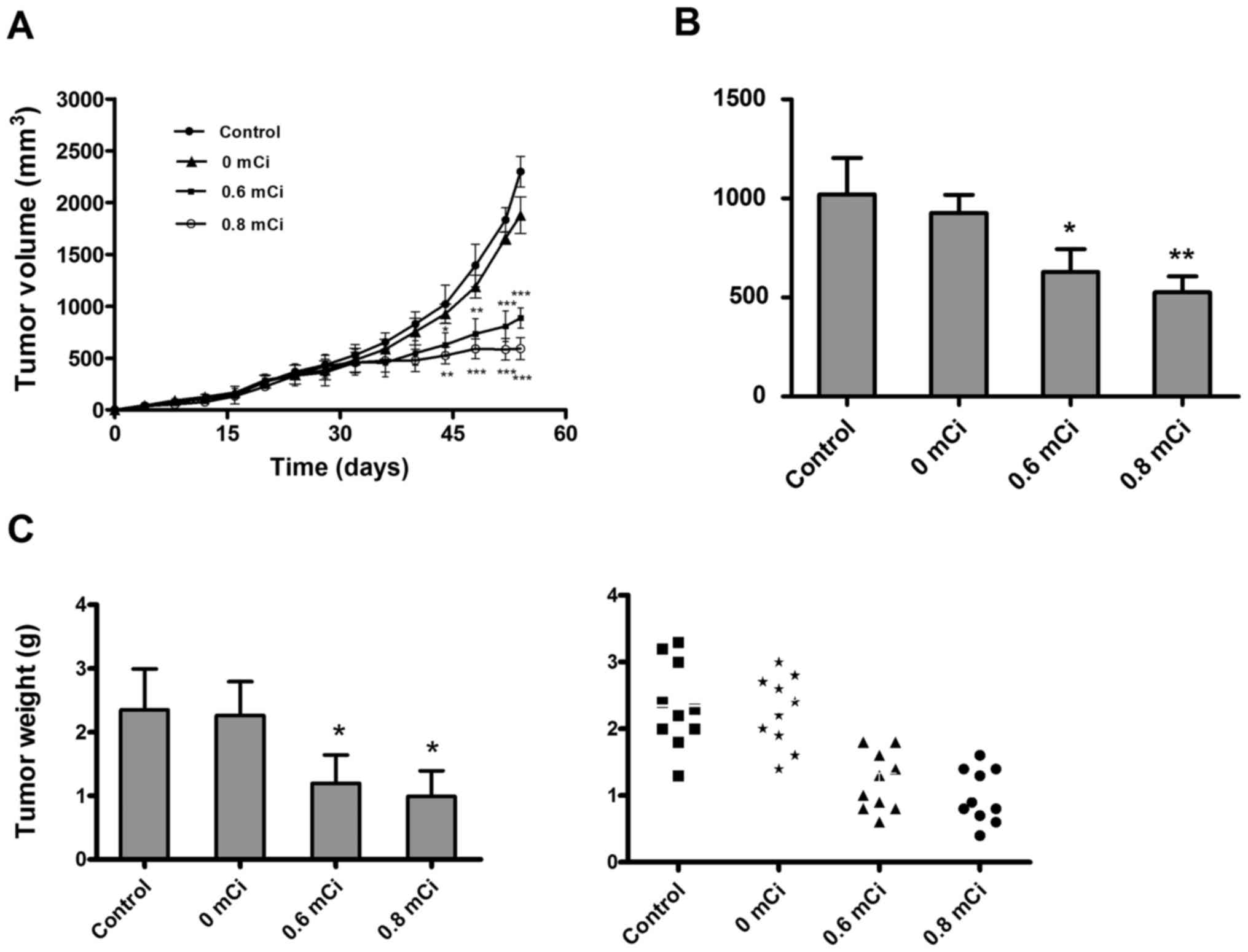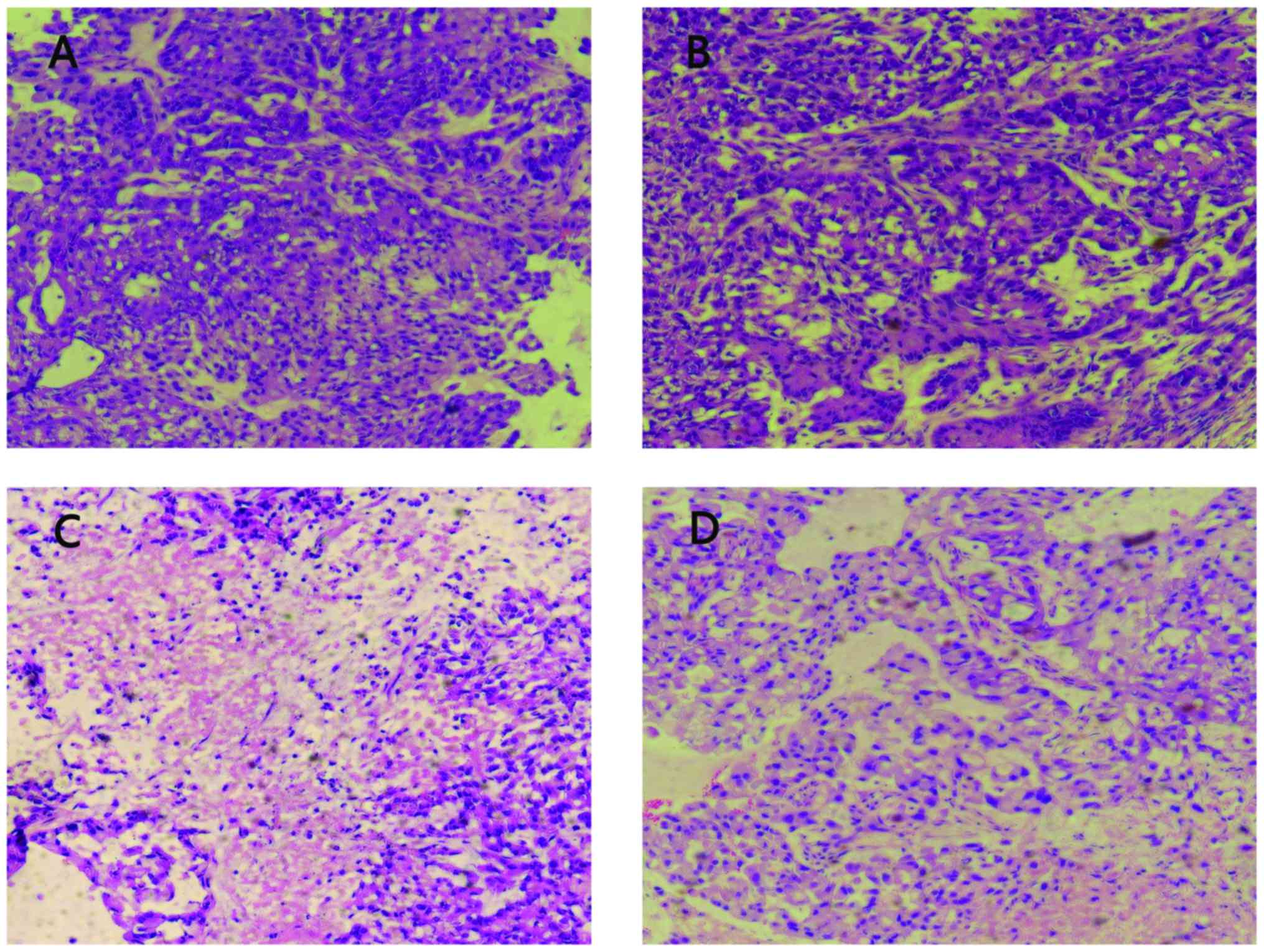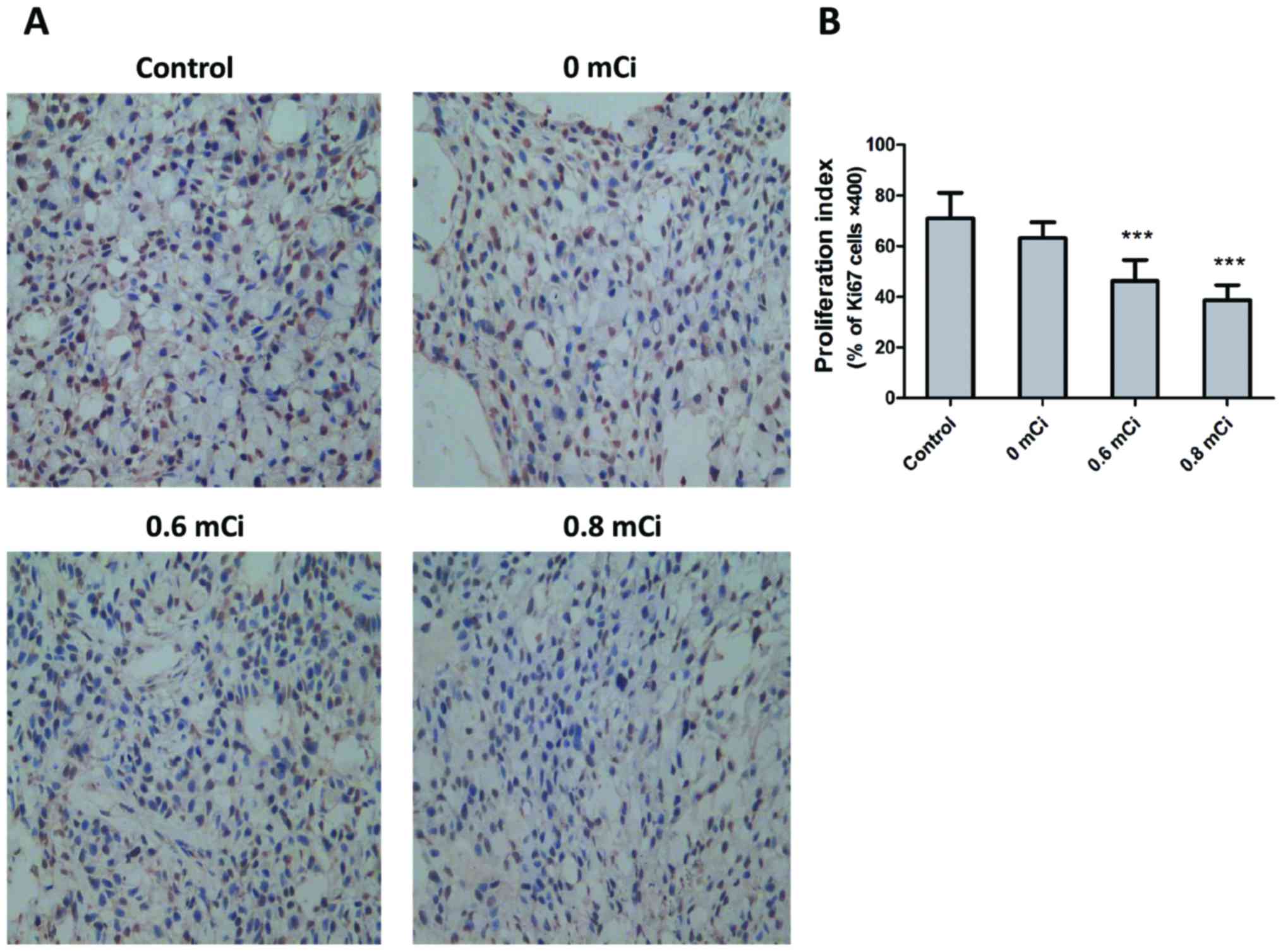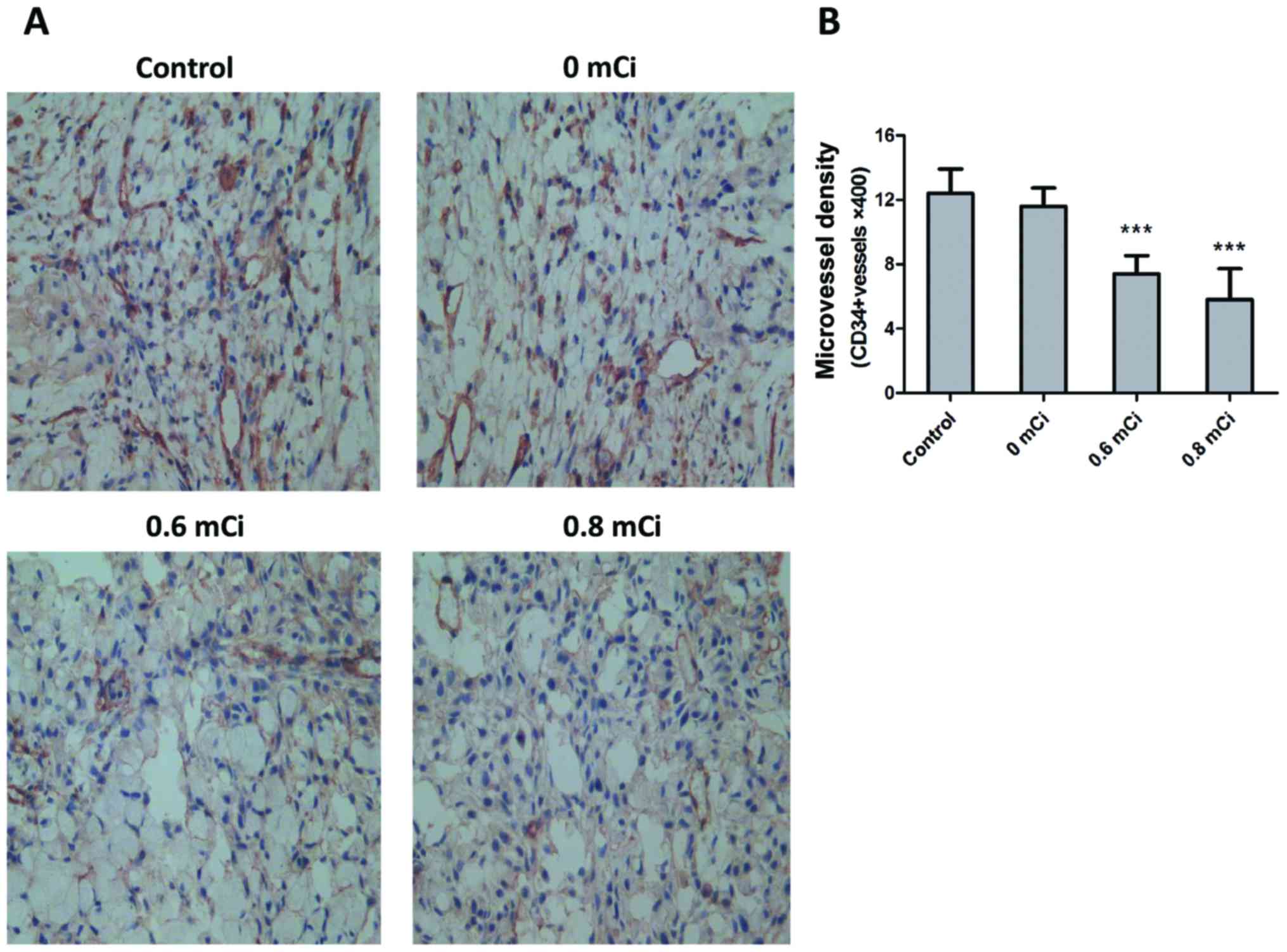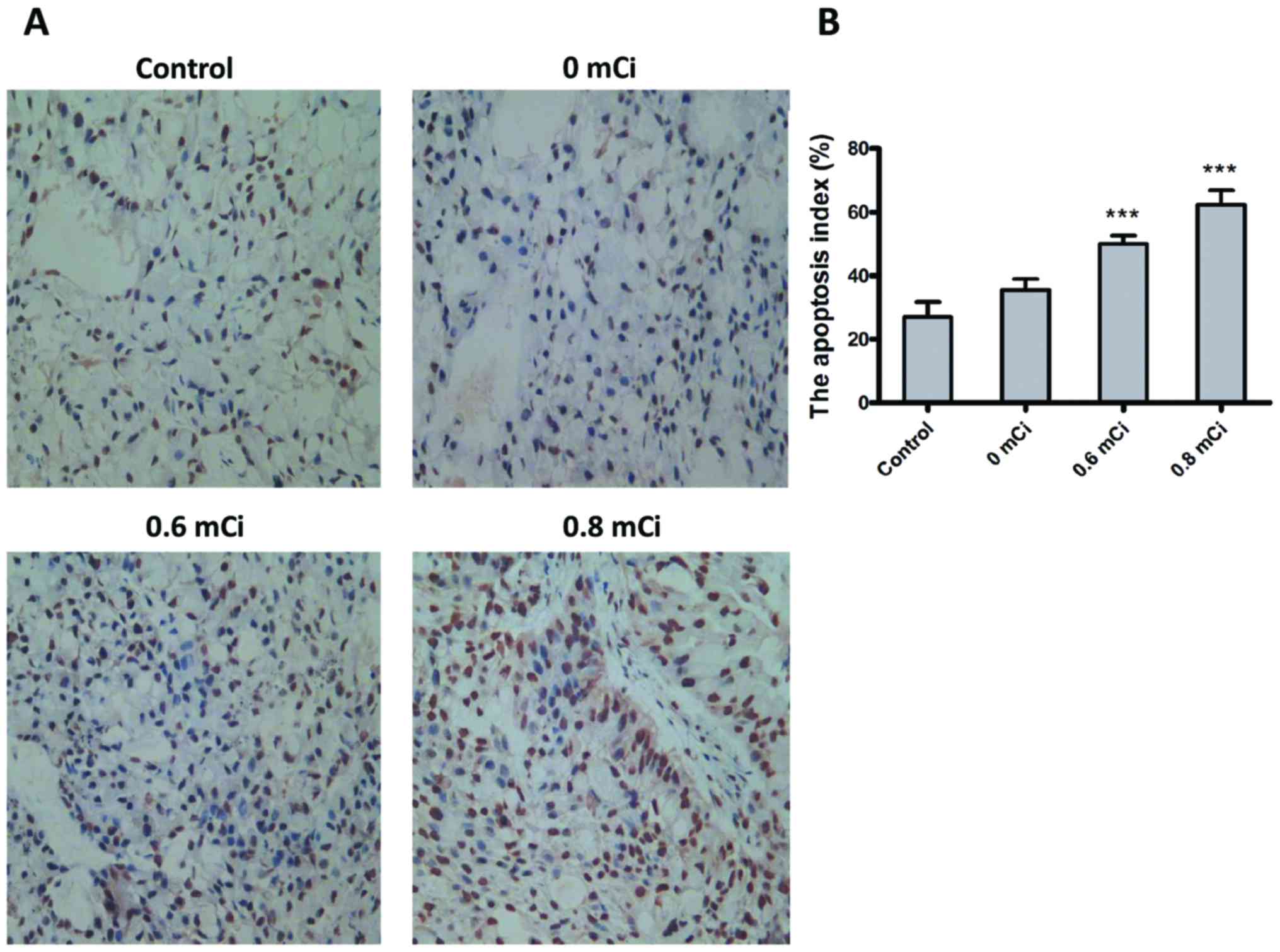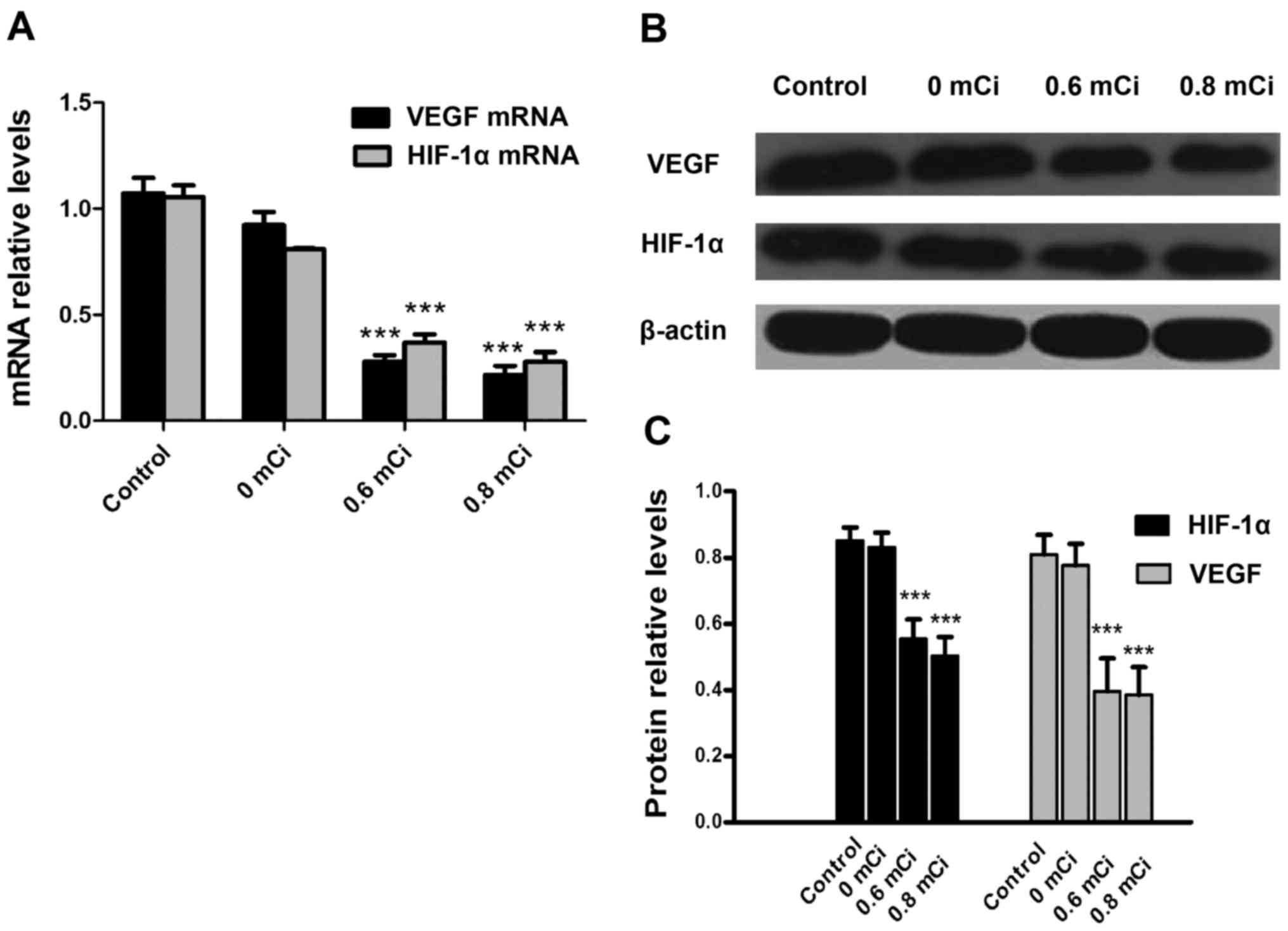|
1
|
McGuire S: World Cancer Report 2014.
Geneva, Switzerland: World Health Organization, International
Agency for Research on Cancer, WHO Press, 2015. Adv Nutr.
7:418–419. 2016. View Article : Google Scholar : PubMed/NCBI
|
|
2
|
Chen W, Zheng R, Zeng H, Zhang S and He J:
Annual report on status of cancer in China, 2011. Chin J Cancer
Res. 27:2–12. 2015. View Article : Google Scholar : PubMed/NCBI
|
|
3
|
Toyokawa G, Takenoyama M and Ichinose Y:
Multimodality treatment with surgery for locally advanced
non-small-cell lung cancer with n2 disease: A review article. Clin
Lung Cancer. 16:6–14. 2015. View Article : Google Scholar : PubMed/NCBI
|
|
4
|
Cardenal F, Nadal E, Jové M and
Faivre-Finn C: Concurrent systemic therapy with radiotherapy for
the treatment of poor-risk patients with unresectable stage III
non-small-cell lung cancer: A review of the literature. Ann Oncol.
26:278–288. 2015. View Article : Google Scholar : PubMed/NCBI
|
|
5
|
Pfister DG, Johnson DH, Azzoli CG, Sause
W, Smith TJ, Baker S Jr, Olak J, Stover D, Strawn JR, Turrisi AT,
et al: American Society of Clinical Oncology: American Society of
Clinical Oncology treatment of unresectable non-small-cell lung
cancer guideline: Update 2003. J Clin Oncol. 22:330–353. 2004.
View Article : Google Scholar : PubMed/NCBI
|
|
6
|
Dillman RO, Hemdon J, Seagren SL, Eaton WL
Jr and Green MR: Improved survival in stage III non-small-cell lung
cancer seven-year follow-up of cancer and leukemia group B (CALGB)
8433 trial. J Natl Cancer Inst. 88:1210–1215. 1996. View Article : Google Scholar : PubMed/NCBI
|
|
7
|
Wagner TD and Yang GY: The role of
chemotherapy and radiation in the treatment of locally advanced
non-small cell lung cancer (NSCLC). Curr Drug Targets. 11:67–73.
2010. View Article : Google Scholar : PubMed/NCBI
|
|
8
|
Liew MS, Sia J, Starmans MH, Tafreshi A,
Harris S, Feigen M, White S, Zimet A, Lambin P, Boutros PC, et al:
Comparison of toxicity and outcomes of concurrent radiotherapy with
carboplatin/paclitaxel or cisplatin/etoposide in stage III
non-small cell lung cancer. Cancer Med. 2:916–924. 2013. View Article : Google Scholar : PubMed/NCBI
|
|
9
|
Cannon DM, Mehta MP, Adkison JB, Khuntia
D, Traynor AM, Tomé WA, Chappell RJ, Tolakanahalli R, Mohindra P,
Bentzen SM, et al: Dose-limiting toxicity after hypofractionated
dose-escalated radiotherapy in non-small-cell lung cancer. J Clin
Oncol. 31:4343–4348. 2013. View Article : Google Scholar : PubMed/NCBI
|
|
10
|
Park DS, Gong IH, Choi DK, Hwang JH, Shin
HS and Oh JJ: Radical prostatectomy versus high dose permanent
prostate brachytherapy using iodine-125 seeds for patients with
high risk prostate cancer: A matched cohort analysis. World J Urol.
31:1511–1517. 2013. View Article : Google Scholar : PubMed/NCBI
|
|
11
|
Wang ZM, Lu J, Liu T, Chen KM, Huang G and
Liu FJ: CT-guided interstitial brachytherapy of inoperable
non-small cell lung cancer. Lung Cancer. 74:253–257. 2011.
View Article : Google Scholar : PubMed/NCBI
|
|
12
|
Joyce F, Burcharth F, Holm HH and Strøyer
I: Ultrasonically guided percutaneous implantation of iodine-125
seeds in pancreatic caicinoma. Int J Radiat Oncol Biol Phys.
19:1049–1052. 1990. View Article : Google Scholar : PubMed/NCBI
|
|
13
|
Wang JJ, Yuan HS, Li JN, Jiang WJ, Jiang
YL and Tian SQ: Interstitial permanent implantation of 125I seeds
as salvage therapy for re-recurrent rectal carcinoma. Int J
Colorectal Dis. 24:391–399. 2009. View Article : Google Scholar : PubMed/NCBI
|
|
14
|
Jiang Y-L, Meng N, Wang J-J, Ran WQ, Yuan
HS, Qu A and Yang RJ: Percutaneous computed
tomography/ultrasonography-guided permanent iodine-125 implantation
as salvage therapy for recurrent squamous cell cancers of head and
neck. Cancer Biol Ther. 9:959–966. 2010. View Article : Google Scholar : PubMed/NCBI
|
|
15
|
Zhang FJ, Li CX, Zhang L, Wu PH, Jiao DC
and Duan GF: Short- to mid-term evaluation of CT-guided 125I
brachytherapy on intra-hepatic recurrent tumors and/or
extra-hepatic metastases after liver transplantation for
hepatocellular carcinoma. Cancer Biol Ther. 8:585–590. 2009.
View Article : Google Scholar : PubMed/NCBI
|
|
16
|
Heelan RT, Hilaris BS, Anderson LL, Nori
D, Martini N, Watson RC, Caravelli JF and Linares LA: Lung tumors:
Percutaneous implantation of I-125 sources with CT treatment
planning. Radiology. 164:735–740. 1987. View Article : Google Scholar : PubMed/NCBI
|
|
17
|
Li W, Guan J, Yang L, Zheng X, Yu Y and
Jiang J: Iodine-125 brachytherapy improved overall survival of
patients with inoperable stage III/IV non-small cell lung cancer
versus the conventional radiotherapy. Med Oncol. 32:3952015.
View Article : Google Scholar : PubMed/NCBI
|
|
18
|
Qu A, Wang H, Li J, Wang J, Liu J, Hou Y,
Huang L and Zhao Y: Biological effects of (125)i seeds radiation on
A549 lung cancer cells: G2/M arrest and enhanced cell death. Cancer
Invest. 32:209–217. 2014. View Article : Google Scholar : PubMed/NCBI
|
|
19
|
Takabayashi K, Kashiwagi K, Kawata T, Sato
T, Matsuoka K, Hisamatsu T, Takaishi H, Hibi T, Ogata H, Yahagi N,
et al: Continuous low-dose irradiation by I-125 seeds induces
apoptosis of gastric cancer cells regardless of histological
origin. Cancer Biol Ther. 15:81–88. 2014. View Article : Google Scholar : PubMed/NCBI
|
|
20
|
Carmeliet P: Manipulating angiogenesis in
medicine. J Intern Med. 255:538–561. 2004. View Article : Google Scholar : PubMed/NCBI
|
|
21
|
Acker T and Plate KH: A role for hypoxia
and hypoxia-inducible transcription factors in tumor physiology. J
Mol Med (Berl). 80:562–575. 2002. View Article : Google Scholar : PubMed/NCBI
|
|
22
|
Folkman J: Tumor angiogenesis: Therapeutic
implications. N Engl J Med. 285:1182–1186. 1971. View Article : Google Scholar : PubMed/NCBI
|
|
23
|
Lee JW, Shahzad MM, Lin YG, Armaiz-Pena G,
Mangala LS, Han HD, Kim HS, Nam EJ, Jennings NB, Halder J, et al:
Surgical stress promotes tumor growth in ovarian carcinoma. Clin
Cancer Res. 15:2695–2702. 2009. View Article : Google Scholar : PubMed/NCBI
|
|
24
|
Hong S-S, Lee H and Kim K-W: HIF-1α: A
valid therapeutic target for tumor therapy. Cancer Res Treat.
36:343–353. 2004. View Article : Google Scholar : PubMed/NCBI
|
|
25
|
Thangarajah H, Yao D, Chang EI, Shi Y,
Jazayeri L, Vial IN, Galiano RD, Du XL, Grogan R, Galvez MG, et al:
The molecular basis for impaired hypoxia-induced VEGF expression in
diabetic tissues. Proc Natl Acad Sci USA. 106:13505–13510. 2009.
View Article : Google Scholar : PubMed/NCBI
|
|
26
|
Peretz T, Nori D, Hilaris B, Manolatos S,
Linares L, Harrison L, Anderson LL, Fuks Z and Brennan MF:
Treatment of primary unresectable carcinoma of the pancreas with
I-125 implantation. Int J Radiat Oncol Biol Phys. 17:931–935. 1989.
View Article : Google Scholar : PubMed/NCBI
|
|
27
|
Mazeron JJ, Noël G, Simon JM, Racadot S
and Jauffret E: Brachytherapy in head and neck cancers. Cancer
Radiother. 7:62–72. 2003.(In French). View Article : Google Scholar : PubMed/NCBI
|
|
28
|
Yu L, Chen H and Cheng W: Influence of
~(125)I continuous low dose-rate irradiation to apoptosis and
DNA-PK expression of human lung carcinoma cell lines. Chinese J
Clin Med. 6:2007.
|
|
29
|
Lin X, Li HR, Lin XF, Yu ME, Tu XW, Hua
ZD, Lin M, Xu NL, Han LL and Chen YS: Silencing of Livin inhibits
tumorigenesis and metastasis via VEGF and MMPs pathway in lung
cancer. Int J Oncol. 47:657–667. 2015.PubMed/NCBI
|
|
30
|
Semenza GL: Targeting HIF-1 for cancer
therapy. Nat Rev Cancer. 3:721–732. 2003. View Article : Google Scholar : PubMed/NCBI
|
|
31
|
Aita M, Fasola G, Defferrari C, Brianti A,
Bello MG, Follador A, Sinaccio G, Pronzato P and Grossi F:
Targeting the VEGF pathway: Antiangiogenic strategies in the
treatment of non-small cell lung cancer. Crit Rev Oncol Hematol.
68:183–196. 2008. View Article : Google Scholar : PubMed/NCBI
|
|
32
|
Gerdes J, Lemke H, Baisch H, Wacker HH,
Schwab U and Stein H: Cell cycle analysis of a cell
proliferation-associated human nuclear antigen defined by the
monoclonal antibody Ki-67. J Immunol. 133:1710–1715.
1984.PubMed/NCBI
|
|
33
|
Semenza GL: Involvement of
hypoxia-inducible factor 1 in human cancer. Intern Med. 41:79–83.
2002. View Article : Google Scholar : PubMed/NCBI
|
|
34
|
Forsythe JA, Jiang BH, Iyer NV, Agani F,
Leung SW, Koos RD and Semenza GL: Activation of vascular
endothelial growth factor gene transcription by hypoxia-inducible
factor 1. Mol Cell Biol. 16:4604–4613. 1996. View Article : Google Scholar : PubMed/NCBI
|
|
35
|
Semenza GL: Hypoxia-inducible factor 1:
Master regulator of O2 homeostasis. Curr Opin Genet Dev.
8:588–594. 1998. View Article : Google Scholar : PubMed/NCBI
|
|
36
|
Wang GL, Jiang BH, Rue EA and Semenza GL:
Hypoxia-inducible factor 1 is a basic-helix-loop-helix-PAS
heterodimer regulated by cellular O2 tension. Proc Natl
Acad Sci USA. 92:5510–5514. 1995. View Article : Google Scholar : PubMed/NCBI
|
|
37
|
Fukuda R, Hirota K, Fan F, Jung YD, Ellis
LM and Semenza GL: Insulin-like growth factor 1 induces
hypoxia-inducible factor 1-mediated vascular endothelial growth
factor expression, which is dependent on MAP kinase and
phosphatidylinositol 3-kinase signaling in colon cancer cells. J
Biol Chem. 277:38205–38211. 2002. View Article : Google Scholar : PubMed/NCBI
|
|
38
|
Kerbel RS: New targets, drugs, and
approaches for the treatment of cancer: An overview. Cancer
Metastasis Rev. 17:145–147. 1998. View Article : Google Scholar : PubMed/NCBI
|
|
39
|
Mouriaux F, Sanschagrin F, Diorio C,
Landreville S, Comoz F, Petit E, Bernaudin M, Rousseau AP, Bergeron
D and Morcos M: Increased HIF-1α expression correlates with cell
proliferation and vascular markers CD31 and VEGF-A in uveal
melanoma. Invest Ophthalmol Vis Sci. 55:1277–1283. 2014. View Article : Google Scholar : PubMed/NCBI
|
|
40
|
Harada H: How can we overcome tumor
hypoxia in radiation therapy? J Radiat Res (Tokyo). 52:545–556.
2011. View Article : Google Scholar
|
|
41
|
Iwasaki A, Kuwahara M, Yoshinaga Y and
Shirakusa T: Basic fibroblast growth factor (bFGF) and vascular
endothelial growth factor (VEGF) levels, as prognostic indicators
in NSCLC. Eur J Cardiothorac Surg. 25:443–448. 2004. View Article : Google Scholar : PubMed/NCBI
|
|
42
|
Kishiro I, Kato S, Fuse D, Yoshida T,
Machida S and Kaneko N: Clinical significance of vascular
endothelial growth factor in patients with primary lung cancer.
Respirology. 7:93–98. 2002. View Article : Google Scholar : PubMed/NCBI
|















